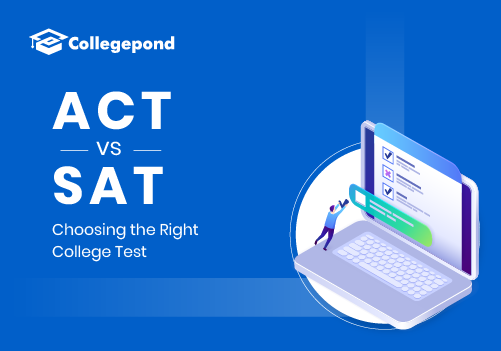
ACT vs SAT: Deciding the Right Test for Your College Journey
The SAT vs ACT debate has always confused college students and parents involved in the complex world of college admissions. It can be challenging to compare these standardised assessments since they have significant differences in their structure, syllabus, and scoring. It’s like comparing apples to oranges. The choice of which test to take should be based on individual strengths, preferences, and academic aspirations. This comprehensive guide thoroughly examines the ACT vs SAT dialogue, shedding light on their similarities and differences. By understanding the specific features of each exam, you’ll be able to make an informed decision that aligns with your abilities and enhances your chances of success.
ACT vs SAT: Unravelling the Key Differences
- Understanding Test Duration and ACT vs SAT Time
The ACT is a slightly longer test, with a total testing time of around 2 hours and 55 minutes (without the optional Writing section) or around 3 hours and 35 minutes (with the optional Writing section). On the other hand, the SAT has a testing time of approximately 3 hours or around 3 hours and 15 minutes (including 15 mins break). The difference in duration may be a factor to consider, especially if you prefer a shorter or longer testing experience.
- Test structure and Purpose
The SAT, developed by the College Board, tests essential skills such as critical thinking, problem-solving, and reasoning. On the other hand, the ACT, created by ACT, Inc., is a comprehensive exam that evaluates student’s knowledge in core academic subjects like Math, English, Reading, and Science. It’s important to understand the purpose and content of each test to choose the one that matches your academic strengths.
- Test Sections and Content Coverage
The ACT comprises four compulsory sections: English, Math, Reading, and Science, and an optional Writing section. This broad coverage suits students who excel in diverse areas. In contrast, the SAT includes sections on Mathematics, Evidence-Based Reading and Writing (combined), and an optional Essay. The SAT’s content coverage is more focused, allowing students to showcase their abilities in specific areas.
- Question Styles and Difficulty
Regarding the ACT and SAT, there are differences in the types of questions and difficulty levels. ACT questions tend to be straightforward and easier to understand right away. On the other hand, the SAT has more complex and challenging questions that may require more in-depth analysis and critical thinking skills. Your preferences for question style and difficulty level should be considered when making a decision.
- Science Section: A Deciding Factor
A significant distinction between the SAT and ACT exams is the presence of a Science section in the ACT, which assesses students’ scientific reasoning and interpretation abilities. If you have a strong grasp of scientific concepts and derive enjoyment from analysing data and experimental passages, the ACT’s Science section provides an opportunity for you to excel. Conversely, if you find science challenging, the SAT may be a more suitable option for you.
- Maths Sections: Complex Concepts vs. Strategic Thinking
The ACT and SAT include Math sections, but they vary in content and approach. The ACT exam covers various mathematical concepts, including more advanced topics. In contrast, the SAT exam focuses on essential maths skills and problem-solving techniques. While the ACT’s maths section may seem more challenging due to its broader scope, the SAT emphasises strategic thinking and applying maths concepts within real-world scenarios.
- Writing Section: Optional or Obligatory
The ACT and SAT tests have different writing sections. The ACT allows students to include a Writing section based on their college application requirements, while the SAT requires an Essay section. It’s essential to check the specific requirements of the colleges you’re applying to decide whether to take the optional writing section.
- SAT vs ACT Score Comparison
The SAT and ACT scoring systems differ in their range, section breakdown, and additional score components. The SAT has a total score range of 400 to 1600, with separate scores for Math and Evidence-Based Reading and Writing. It also provides subscores and an optional essay score. On the other hand, the ACT uses a composite score ranging from 1 to 36, averaging the scores from the four mandatory sections. It offers subscores, an optional writing score, and a STEM score.
It’s worth noting that the SAT deducts points for incorrect answers, which is called the “guessing penalty.” This is meant to discourage guessing randomly. On the other hand, the ACT doesn’t take points away for wrong answers. Remember that this difference may impact how you approach answering questions and guessing strategies.
Choosing the Right Test: Factors to Consider
After examining the main distinctions between the ACT and SAT tests, it’s time to consider the factors that will aid in deciding the most suitable test for you.
- Academic Strengths and Preferences
When deciding between the ACT and SAT exams, it’s essential to consider your academic strengths and interests. The ACT’s broad curriculum-based format may be a good fit if you perform well in many subjects and have a solid academic background. However, if you excel in maths and critical reading, the SAT’s concentrated content may better showcase your abilities.
2. Test-Taking Skills and Strategies
Assess your test-taking abilities and strategies to determine whether the ACT or SAT fit you better. The ACT requires quick time management skills, as there are many questions to be answered in a short period of time. If you work well under pressure and prefer this type of pacing, the ACT may be the better choice. However, the SAT may be more suitable for you if you prefer a slower, more focused approach with more time to dedicate to each question.
3. College Requirements and Preferences
Before applying to colleges, it’s important to research their admissions requirements. Some colleges accept both the ACT and SAT exams, but others may have a preference for one over the other. Additionally, certain colleges may have specific subject requirements, like a minimum score in the Science section or in the Essay. Selecting the test that aligns with your target colleges’ preferences will increase your chances of meeting their requirements and being accepted.
- Practice and Preparation Resources
Explore the available practice and preparation resources for both the ACT and SAT. Familiarise yourself with the layout, question sorts, and scoring structures of each test. Take advantage of legitimate practice assessments, look at courses, on-line assets, and tutoring alternatives to assess your overall performance and identify areas for improvement. Feeling comfortable and confident with the test format can undoubtedly impact your overall performance.
- Future Career Goals
Consider your future career goals and the relevance of each test to your intended field of study. While neither the ACT nor SAT is directly tied to specific professions, some fields may place more emphasis on certain skills assessed by one test over the other. For example, plan to pursue a degree in a STEM-related field. The ACT’s inclusion of a Science section may provide a better opportunity to demonstrate your scientific aptitude.
Choosing between the SAT and ACT is a personal decision that depends on your strengths, preferences, and college requirements. Each test has its own benefits and obstacles, and it’s essential to consider these factors carefully before deciding. Remember, your test scores are just one factor in the college admissions process. Admissions committees also consider your academic achievements, extracurricular involvement, letters of recommendation, and personal essays. To present a strong and well-rounded profile, focus on showcasing your abilities beyond just standardised testing.
If you are still unsure about which test to take as you embark on your journey abroad, consider scheduling a Free 1-on-1 Counselling Session with our expert counsellors.




